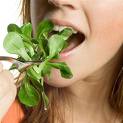
The following is a summary of guidelines that help to create the optimum conditions for digestion. By following these steps, you will be allowing your own processes of digestion, absorption, elimination and intestinal immunity to work as efficiently as possible.
- Eat only when genuinely hungry
- Have the largest meal in the middle of the day
- Spend at least 30 minutes eating each meal
- Allow no more than 3.5 hours between main meals
- Have 3 main meals and 2 snacks each day
- Consume nothing after 9:00pm
- Do not eat when angry, anxious, upset, bored or overtired
- Eat with congenial company in pleasant conversation or eat alone in contemplative silence or with pleasant music
- Avoid reading, watching TV or arguing while eating
- Eat slowly, chewing food thoroughly
- Take time to enjoy the taste, texture, and aromas of the food
- Swallow only when eat mouthful has turned to paste
- Eat only enough to feel good. Never stuff yourself
- Drink two litres of good quality water daily
- Be sure to consume 25 – 30 grams of fibre each day
- Avoid processed foods, refined sugars and flours
- Consume alcohol and caffeine sparingly, if at all
- Suspect allergy/intolerance to any food to which one has addictive cravings or to any that produces excess mucus, or gastrointestinal stress of any kind.
- Observe you’re body’s reactions to lactose, gluten and wheat
Food Combining
- Do not combine sugars with proteins or fats at the same meal
- Have fruits/juices 30 minutes before or three hours after meals
- Do not drink liquids during meals, as they dilute stomach acids. Drink at the end of the meal only.
- Take a good quality multi-vitamin/mineral supplement
- Support digestive weaknesses by taking digestive enzyme supplements.



